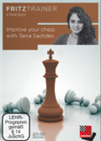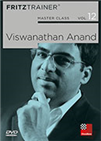High schoolers in the lead
The second team presented by India is one of two squads still on a perfect match score after five rounds at the Chess Olympiad in Chennai. This development did not seem at all impossible before the tournament — moreover, some predicted it would happen this way, given how well the youngster have been playing throughout the year. The team, consisting of four rising stars aged 16 to 18, supported by the experienced Adhiban, defeated the fourth seeds from Spain in Tuesday’s fifth round.
 Dutch Grandmaster Roeland Pruijssers and International Master Nico Zwirs created a complete repertoire against the Sicilian that is based on the Open Sicilian and that is easy to learn. They show patterns you should know when playing the Open Sicilian
Dutch Grandmaster Roeland Pruijssers and International Master Nico Zwirs created a complete repertoire against the Sicilian that is based on the Open Sicilian and that is easy to learn. They show patterns you should know when playing the Open SicilianLeading the group is Gukesh, who had just surpassed the 2700-rating barrier for the first time last month. The youngster could not have asked for a better start at the Olympiad, as he scored five wins in as many games to climb to world number 27 with a 2714.1 live rating.
Nihal Sarin (18 years old), Praggnanandhaa (16) and Raunak Sadhwani (16) have a combined 9½/12 score. The players’ extremely young age prompted Olimpiu Di Luppi to share a quip on Twitter — one that, remarkably, is almost a hundred percent accurate!
This should not underestimate the valuable presence of Adhiban, who scored a crucial victory over Spain’s Eduardo Iturrizaga in round 5. The three remaining boards saw Nihal signing a draw with the ever-dangerous David Anton, Praggnanandhaa losing to Jaime Santos and Gukesh beating living legend Alexei Shirov with the black pieces.
Out of a positional variation in the Sicilian, both sides found refuge for their kings on the queenside. In a queenless middlegame with asymmetrical pawn structures, Black emerged with a superior position thanks to the activity of his king.
In the diagrammed position, Gukesh was already in the driver’s seat, and he went on to cement his advantage by playing 35...Re2, 36...Kd5 and 37...Ke4 on the next three moves.
Shirov resigned seven moves later.

The high schoolers, and Adhiban a.k.a. The Beast | Photo: Stev Bonhage
A well-balanced Armenian team is sharing the lead with the Indians. With players aged 24 to 38, the Caucasians are a force to be reckoned with, despite the absence of Levon Aronian and Vladimir Akopian — these two players led the teams that won three out of four Olympiads between 2006 and 2012, and both have now transferred to the United States.
The Armenians are undefeated on individual boards, with Hrant Melkumyan and Robert Hovhannisyan their top scorers in Chennai. In round 5, they beat England by a 2½-1½ score thanks to a win by Melkumyan, who got the better of Luke McShane on board 3.
39...Rc4, cutting the white king along the fourth rank, was Black’s best defensive alternative here. McShane’s 39...Ke6, on the other hand, allowed White to decisively activate his king with 40.Kg4 b3 41.f4.
Melkumyan showed good technique to convert his advantage into a 57-move victory.

Gabriel Sargissian facing Michael Adams on board 1 of the Armenia vs England confrontation | Photo: Lennart Ootes
India 2 v Spain / Armenia v England
Select an entry from the list to switch between games
Cuba over-performing
Five teams stand a point behind the leaders on 9/10 match points. The rating favourites from the United States are joined by India 1 (2nd seeds), Iran (13th), Uzbekistan (14th) and Cuba (32nd) in the chasing group.
While Iran and Uzbekistan defeated lower-rated opponents by 3-1 and 4-0 scores, both United States and India won by the smallest margins in round 5. Leinier Dominguez and Arjun Erigaisi scored the crucial wins for the US and India respectively. Meanwhile, Cuba upset a nominally strong team for a third consecutive time.
Cuba beat Azerbaijan by a 2½-1½ score. Yasser Quesada’s loss on first board was offset by wins on boards 2 and 3 — Carlos Albornoz beat Rauf Mamedov, while Luis Ernesto Quesada got the better of Vasif Durarbayli.
Albornoz fended off Mamedov’s queenside attack in a sharp Sicilian, while slowly but surely advancing the strong pawn phalanx in front of his king.
Black’s attack is running out of fuel, and after 35.c6 it is difficult to imagine Mamedov finding a way to deal with the connected passers on the queenside. Three moves later, the Azerbaijani threw in the towel.

Cuba’s Yasser Quesada started with four wins in as many games — luckily for him, his loss against Shakhriyar Mamedyarov did not prevent his team from scoring a remarkable upset | Photo: Lennart Ootes
All games from matches mentioned in this section
Other noteworthy results
There were not as many surprising results in round 5 compared to the previous round. Given the record number of teams, though, it is unlikely we will see a single round without unexpected outcomes in Chennai. Here we list a few from Tuesday:
 Let our authors show you how Carlsen tailored his openings to be able to outplay his opponents strategically in the middlegame or to obtain an enduring advantage into the endgame.
Let our authors show you how Carlsen tailored his openings to be able to outplay his opponents strategically in the middlegame or to obtain an enduring advantage into the endgame.
- Moldova (48th seeds) drew Greece (25th) thanks to Dragos Ceres’ victory on board 4.
- Belgium (50th) drew Australia (29th) after Sim Maerevoet managed to defeat Jutin Tan with white on board 3.
- Colombia (51st) drew Argentina (30th) in the all-South American confrontation. All four games finished drawn.
- Philippines (52nd) defeated Sweden (31st) thanks to Mark Paragua’s victory over Erik Blomqvist on top board.
- After upsetting Denmark and Egypt in rounds 2 and 4, Zambia faced Norway in round 5. Remarkably, world champion Magnus Carlsen played for Norway — a commendable decision, given the massive rating difference. Norway won by a 3½-½ score, and Carlsen got to checkmate Gillian Bwalya, but having the honour of playing opposite the strongest chess player of this era was certainly a nice reward for Zambia’s formidable performance in Chennai.

Chess has taken over India! | Photo: Stev Bonhage
All games from matches mentioned in this section
India, Georgia and Romania lead in the women’s section
Three teams have a perfect 10/10 match score in the women’s event. The 20th seeds from Romania upset Poland to go into round 6 tied with pre-tournament favourites India and Georgia atop the standings table.
The Indians have yet to lose a single game in Chennai. Facing the strong French squad on Tuesday, everything was decided in the game between Tania Sachdev and Andrea Navrotescu on board 4, as all the remaining encounters finished drawn.
Sachdev, who has been playing impressively in the Olympiad, collected a 38-move win to secure her team’s victory for a second day in a row — she also won the one decisive game against Hungary in the fourth round. The well-known commentator converted an advantageous opposite-coloured bishops position into a full point.
GM Karsten Müller analysed the final phase of the game.
 On this DVD, well-known Indian WGM Tania Sachdev shows you how to evaluate certain positions and then find the right concepts and plans on the basis of her own games.
On this DVD, well-known Indian WGM Tania Sachdev shows you how to evaluate certain positions and then find the right concepts and plans on the basis of her own games.
Tania Sachdev | Photo: Stev Bonhage
Meanwhile, Romania defeated Poland in a highly enjoyable match. Boards 2, 3 and 4 saw the players with the white pieces scoring wins. Mihaela Sandu (currently on 3½/4 in Chennai) and Elena-Luminita Cosma (on 4/4) scored for Romania, while Oliwia Kiolbasa (on 5/5) collected the one victory for the Polish team.
The match would have ended drawn had Irina Bulmaga not shown the proper defensive technique in her game with black against recently transferred Alina Kashlinskaya. The latter had four pawns dangerously advancing down the board against Bulmaga’s knight and pawn.
GM Müller’s instructive analysis shows us where the Romanian could have gone wrong in the double-edged endgame.

Irina Bulmaga calculates as Alina Kashlinskaya probably tries to figure out how to maximize her winning chances — by this point, the Polish representative knew she needed to win to draw the match | Photo: Stev Bonhage
India v France / Ukraine v Azerbaijan / Georgia v India 2 / Romania v Poland
Round 6 pairings - Open
 This DVD allows you to learn from the example of one of the best players in the history of chess and from the explanations of the authors how to successfully organise your games strategically, and how to keep your opponent permanently under pressure.
This DVD allows you to learn from the example of one of the best players in the history of chess and from the explanations of the authors how to successfully organise your games strategically, and how to keep your opponent permanently under pressure.
| 1 |
11 |
|
IND2 |
India 2 |
17½ |
10 |
|
: |
|
10 |
15 |
Armenia |
ARM |
|
12 |
| 2 |
14 |
|
UZB |
Uzbekistan |
17 |
9 |
|
: |
|
9 |
15 |
India |
IND |
|
2 |
| 3 |
1 |
|
USA |
United States |
13½ |
9 |
|
: |
|
9 |
14½ |
Iran |
IRI |
|
13 |
| 4 |
32 |
|
CUB |
Cuba |
15½ |
9 |
|
: |
|
8 |
14½ |
Spain |
ESP |
|
4 |
| 5 |
5 |
|
POL |
Poland |
13½ |
8 |
|
: |
|
8 |
13 |
Serbia |
SRB |
|
23 |
| 6 |
7 |
|
NED |
Netherlands |
16 |
8 |
|
: |
|
8 |
16 |
Georgia |
GEO |
|
24 |
| 7 |
9 |
|
GER |
Germany |
14 |
8 |
|
: |
|
8 |
15 |
Italy |
ITA |
|
26 |
| 8 |
10 |
|
ENG |
England |
14½ |
8 |
|
: |
|
8 |
13 |
Austria |
AUT |
|
33 |
| 9 |
36 |
|
SUI |
Switzerland |
12½ |
8 |
|
: |
|
8 |
15½ |
France |
FRA |
|
15 |
| 10 |
16 |
|
IND3 |
India 3 |
13½ |
8 |
|
: |
|
8 |
14½ |
Lithuania |
LTU |
|
35 |
| 11 |
37 |
|
PER |
Peru |
13½ |
8 |
|
: |
|
8 |
14½ |
Croatia |
CRO |
|
17 |
| 12 |
40 |
|
KAZ |
Kazakhstan |
15 |
8 |
|
: |
|
8 |
16 |
Czech Republic |
CZE |
|
18 |
| 13 |
52 |
|
PHI |
Philippines |
14 |
8 |
|
: |
|
8 |
15½ |
Israel |
ISR |
|
22 |
| 14 |
29 |
|
AUS |
Australia |
15 |
7 |
|
: |
|
7 |
14 |
Norway |
NOR |
|
3 |
| 15 |
34 |
|
SVK |
Slovakia |
12 |
7 |
|
: |
|
7 |
13½ |
Azerbaijan |
AZE |
|
6 |
...96 boards
Round 6 pairings - Women
| 1 |
1 |
|
IND |
India *) |
15½ |
10 |
|
: |
|
10 |
15 |
Georgia |
GEO |
|
3 |
| 2 |
20 |
|
ROU |
Romania |
14½ |
10 |
|
: |
|
9 |
15½ |
Ukraine |
UKR |
|
2 |
| 3 |
6 |
|
AZE |
Azerbaijan |
15½ |
9 |
|
: |
|
9 |
15 |
Kazakhstan |
KAZ |
|
10 |
| 4 |
18 |
|
SRB |
Serbia |
14½ |
8 |
|
: |
|
8 |
15½ |
Poland |
POL |
|
4 |
| 5 |
17 |
|
NED |
Netherlands |
13½ |
8 |
|
: |
|
8 |
15 |
France |
FRA |
|
5 |
| 6 |
19 |
|
ISR |
Israel |
14 |
8 |
|
: |
|
8 |
14½ |
Germany |
GER |
|
8 |
| 7 |
21 |
|
ENG |
England |
13½ |
8 |
|
: |
|
8 |
16½ |
Armenia |
ARM |
|
9 |
| 8 |
23 |
|
CZE |
Czech Republic |
13½ |
8 |
|
: |
|
8 |
14 |
India 2 |
IND2 |
|
11 |
| 9 |
24 |
|
VIE |
Vietnam |
13½ |
8 |
|
: |
|
8 |
14½ |
Hungary |
HUN |
|
12 |
| 10 |
15 |
|
BUL |
Bulgaria |
16 |
8 |
|
: |
|
8 |
15 |
Peru |
PER |
|
31 |
| 11 |
47 |
|
DEN |
Denmark |
15 |
8 |
|
: |
|
7 |
15 |
Spain |
ESP |
|
13 |
| 12 |
14 |
|
CUB |
Cuba |
13 |
7 |
|
: |
|
7 |
13½ |
Colombia |
COL |
|
33 |
| 13 |
35 |
|
AUS |
Australia |
13 |
7 |
|
: |
|
7 |
12½ |
India 3 |
IND3 |
|
16 |
| 14 |
36 |
|
BRA |
Brazil |
13½ |
7 |
|
: |
|
7 |
12 |
Slovakia |
SVK |
|
22 |
| 15 |
43 |
|
CRO |
Croatia |
12 |
7 |
|
: |
|
7 |
15 |
Slovenia |
SLO |
|
26 |
...78 boards
*) This team is assigned to a fixed board.
Links
























